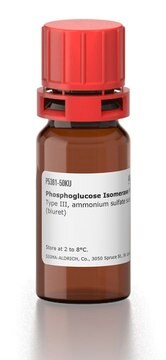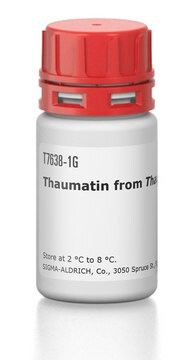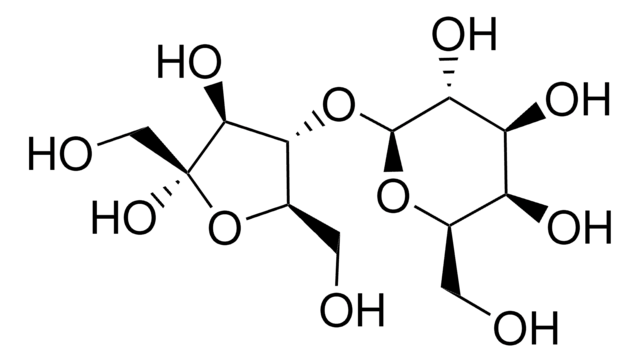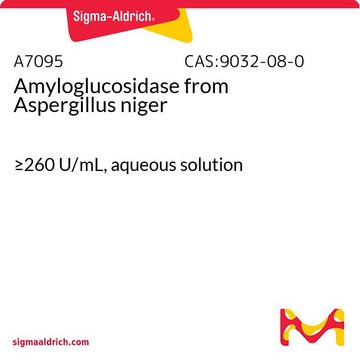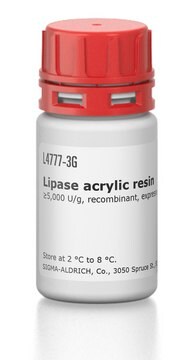G4166
Glucose Isomerase from Streptomyces murinus
≥350 U/g
Synonyme(s) :
Sweetzyme® IT Extra, D-xylose ketol-isomerase
Se connecterpour consulter vos tarifs contractuels et ceux de votre entreprise/organisme
About This Item
Numéro MDL:
Code UNSPSC :
12352204
Nomenclature NACRES :
NA.54
Produits recommandés
Source biologique
Streptomyces sp. (S. murinus)
Forme
powder
Activité spécifique
≥350 U/g
Température de stockage
2-8°C
Description générale
Immobilized glucose isomerase produced from a selected strain of Streptomyces murinus.
Application
Glucose Isomerase from Streptomyces murinus has been used to isomerize xylose to xylulose during the production of dihydrogen from Xylose. It has also been used in the synthetic enzymatic pathway for dihydrogen production from sucrose, to catalyze isomerization of glucose to fructose.
Immobilized glucose isomerase produced from Streptomyces murinus was used for the isomerization of xylose. Glucose isomerase is used in the food industry to produce high-fructose corn syrup.
Actions biochimiques/physiologiques
Few anaerobic bacteria, fungi and plants express an intracellular metalloenzyme called D-xylose isomerase (XI). Most bacteria use the enzyme D-xylose isomerase to transform D-xylose to D-xylulose. D-Xylose isomerase (XI) converts the aldo-sugars xylose and glucose to their keto analogs xylulose and fructose.
Glucose isomerase has wide variety of industrial applications such as producing high-fructose corn syrup (HFCS) and production of ethanol from hemicelluloses. In addition, it also facilitates the study of structure-function relationships by advanced biochemical and genetic engineering techniques.
Propriétés physiques
0.33 g yields an approximate bed volume of 1ml
Définition de l'unité
one unit converts glucose to fructose at an initial rate of 1 μmole per min at standard analytical conditions
Informations légales
A product of Novozyme Corp.
Sweetzyme is a registered trademark of Novozymes Corp.
Code de la classe de stockage
11 - Combustible Solids
Classe de danger pour l'eau (WGK)
WGK 3
Point d'éclair (°F)
Not applicable
Point d'éclair (°C)
Not applicable
Équipement de protection individuelle
Eyeshields, Gloves, type N95 (US)
Certificats d'analyse (COA)
Recherchez un Certificats d'analyse (COA) en saisissant le numéro de lot du produit. Les numéros de lot figurent sur l'étiquette du produit après les mots "Lot" ou "Batch".
Déjà en possession de ce produit ?
Retrouvez la documentation relative aux produits que vous avez récemment achetés dans la Bibliothèque de documents.
Les clients ont également consulté
Hang Zhou et al.
Metabolic engineering, 14(6), 611-622 (2012-08-28)
Xylose is the main pentose and second most abundant sugar in lignocellulosic feedstocks. To improve xylose utilization, necessary for the cost-effective bioconversion of lignocellulose, several metabolic engineering approaches have been employed in the yeast Saccharomyces cerevisiae. In this study, we
Philipp M Grande et al.
ChemSusChem, 5(7), 1203-1206 (2012-05-25)
Do you sea water? Water consumption will be a challenge in biorefineries, and the use of non-drinkable sources of water will be preferred. Herein, glucose is converted into 5-hydroxymethylfurfural (HMF) in a chemo-enzymatic one-pot, two-step procedure, involving immobilized glucose isomerase
Hector Urbina et al.
PloS one, 7(6), e39128-e39128 (2012-06-22)
Many of the known xylose-fermenting (X-F) yeasts are placed in the Scheffersomyces clade, a group of ascomycete yeasts that have been isolated from plant tissues and in association with lignicolous insects. We formally recognize fourteen species in this clade based
Sun-Mi Lee et al.
Applied and environmental microbiology, 78(16), 5708-5716 (2012-06-12)
The heterologous expression of a highly functional xylose isomerase pathway in Saccharomyces cerevisiae would have significant advantages for ethanol yield, since the pathway bypasses cofactor requirements found in the traditionally used oxidoreductase pathways. However, nearly all reported xylose isomerase-based pathways
Andrey Kovalevsky et al.
Acta crystallographica. Section D, Biological crystallography, 68(Pt 9), 1201-1206 (2012-09-06)
D-Xylose isomerase (XI) converts the aldo-sugars xylose and glucose to their keto analogs xylulose and fructose, but is strongly inhibited by the polyols xylitol and sorbitol, especially at acidic pH. In order to understand the atomic details of polyol binding
Notre équipe de scientifiques dispose d'une expérience dans tous les secteurs de la recherche, notamment en sciences de la vie, science des matériaux, synthèse chimique, chromatographie, analyse et dans de nombreux autres domaines..
Contacter notre Service technique

